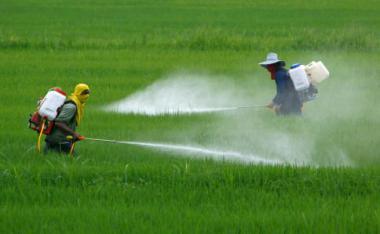Individuals exposed for at least 30 years to certain chemicals in pesticides and detergents are up to 32% more likely to develop lymphoma. So concludes a study led by Silvia de Sanjose and Laura Costas, Research Program in Cancer Epidemiology, ICO has published the British Journal of Cancer.
Lymphoma
Lymphoma is a malignant proliferation of lymphocytes, cells that are part of the body’s immune system. It usually occurs in the lymph nodes, but can also affect other tissues such as liver and spleen. Meanwhile, chronic lymphatic leukemia affects the lymphocytes circulating in the blood.
There are several types of lymphoma, which are divided into two main groups: non-Hodgkin lymphoma and Hodgkin (or Hodgkin’s disease). In both groups, the incidence is higher in men than in women. The first group, the incidence is 12.3 cases per 100,000 population in men and 10.8 in the case of women. In the case of Hodgkin lymphoma is 2.5 cases per 100,000 in men and 2.1 cases in women.
Search for causes
There are no clear reasons to explain the occurrence of lymphoma. Several studies indicate that the chances of suffering increase in people undergoing organ transplants or suffering from viral infections such as HIV, hepatitis C or late infection of Epstein-Barr.
The study published in The British Journal of Cancer Epilymph part of the project, which was carried out in six European countries (Spain, France, Germany, Italy, Ireland and the Czech Republic).
2,178 people diagnosed with lymphoma and 2,457 healthy of similar age and sex were interviewed. Among others, the participants had to indicate those works that had developed full-time for at least a year.
Researchers have found that men who were in contact with certain chemicals for at least 30 years have up to 32% increased risk of developing lymphoma than people who were not exposed to these products. This association was not found in women.
The chemicals in question are known as endocrine disruptors, ie that interfere with hormones of the endocrine system: can activate or block the hormone receptors or modify the production of natural hormones. Are present especially pesticides, detergents, plastics additives and fire retardants. The study found that the timely exposure does not increase the risk of lymphoma, but it does continued.
The findings of this study are consistent with those of a study carried out among more than 82,000 US farmers, has determined that those who have been exposed to pesticides also have increased risk of lymphoma.
Occupational exposure to endocrine disruptors and lymphoma risk in a multicentric European study. British Journal of Cancer (2015): 1-6 | doi: 10.1038 / bjc.2015.83

